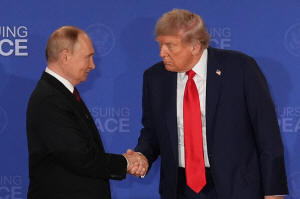Trump says he'll meet with Putin in Hungary. He first meets Friday with
Zelenskyy at the White House
[October 17, 2025]
By AAMER MADHANI, SEUNG MIN KIM and CHRIS MEGERIAN
WASHINGTON (AP) — President Donald Trump is redoubling his efforts to
end the war in Ukraine, announcing a second meeting with Russia's
Vladimir Putin one day before sitting down with Ukraine's Volodymyr
Zelenskyy at the White House.
Trump's announcement came shortly after finishing a call with Putin on
Thursday. A date has not been set, but Trump said the meeting would take
place in Budapest, Hungary, and suggested that it could happen in about
two weeks.
“I believe great progress was made with today’s telephone conversation,”
Trump wrote on social media. The two leaders previously met in Alaska in
August, which did not produce a diplomatic breakthrough, a source of
frustration for the U.S. leader who had expected that his longstanding
relationship with Putin could pave the way to resolving a conflict that
began nearly four years ago.
Yuri Ushakov, Putin’s foreign affairs adviser, said the Russian
president initiated the call, which he described as “very frank and
trusting.” He said Putin emphasized to Trump that selling long-range
Tomahawk missiles to Ukraine, something the U.S. president has publicly
discussed, would “inflict significant damage to the relations between
our countries.”
Trump was already scheduled to meet Friday with Zelenskyy, who has been
seeking weapons that would allow Ukrainian forces to strike deeper into
Russian territory. Zelenskyy has argued such strikes would help compel
Putin to take Trump’s calls for direct negotiations to end the war more
seriously.
Trump previously said that the U.S. has “a lot of Tomahawks,” but on
Thursday he said stockpiles were limited and may not have missiles to
spare.
“We have a lot of them, but we need them” he said. “I mean, we can't
deplete for our country.”

Trump tries to turn campaign promises into reality
Trump’s renewed focus on the war in Ukraine comes after forging a
ceasefire that could end the war between Israel and Hamas in Gaza, a
diplomatic accomplishment that he celebrated with a whirlwind trip to
Israel and Egypt on Monday.
Ending the wars in Ukraine and Gaza was central to Trump's campaign
pitch last year, when he persistently pilloried President Joe Biden for
his handling of the conflicts.
Although there has been fragile progress in Gaza, Trump has been stymied
by Putin, unable to persuade the Russian leader to hold direct talks
with Zelenskyy.
Earlier this week in Jerusalem, in a speech to the Knesset, Trump
predicted the truce in Gaza would lay the groundwork for the U.S. to
help Israel and many of its Middle East neighbors normalize relations.
Trump also made clear his top foreign policy priority now is ending the
largest armed conflict in Europe since World War II.
“First we have to get Russia done,” Trump said, turning to his special
envoy Steve Witkoff, who has also served as his administration's chief
interlocutor with Putin. “We gotta get that one done. If you don’t mind,
Steve, let’s focus on Russia first. All right?”
Trump weighs Tomahawks for Ukraine
Friday's meeting with Trump and Zelenskyy will be their fourth
face-to-face encounter this year. After their initial Oval Office
conversation devolved into recriminations, they've forged a more
amicable relationship.
Trump has said he's considering selling long-range Tomahawk missiles to
Kyiv, something Putin has said could further damage relations between
Moscow and Washington.

[to top of second column]
|

President Donald Trump, right, shakes the hand of Russia's President
Vladimir Putin during a joint press conference at Joint Base
Elmendorf-Richardson, Alaska, Aug. 15, 2025. (AP Photo/Jae C. Hong,
File)

Although such a sale would be a splashy move, it could take years to
provide the equipment and training necessary for Ukraine to use
Tomahawks, said Mark Montgomery, an analyst at the hawkish Foundation
for Defense of Democracies in Washington.
Montgomery said Ukraine could be better served in the near term with a
surge of Extended Range Attack Munition, or ERAM, missiles and Army
Tactical Missile System, known as ATACMS. The U.S. already approved the
sale of up to 3,350 ERAMs to Kyiv earlier this year.
The Tomahawk, with a range of about 995 miles (1,600 kilometers), would
allow Ukraine to strike far deeper in Russian territory than either the
ERAM (about 285 miles, or 460 km) or ATACMS (about 186 miles, or 300
kilometers).
“To provide Tomahawks is as much a political decision as it is a
military decision,” Montgomery said. “The ERAM is shorter range, but
this can help them put pressure on Russia operationally, on their
logistics, the command and control, and its force disbursement within
several hundred kilometers of the front line. It can be very effective.”
Signs of White House interest in new Russia sanctions
Waiting for Trump’s blessing is legislation in the Senate that would
impose steep tariffs on countries that purchase Russia’s oil, gas,
uranium and other exports in an attempt to cripple Moscow economically.
Though the president hasn’t formally endorsed it — and Republican
leaders do not plan to move forward without his support — the White
House has shown, behind the scenes, more interest in the bill in recent
weeks. Senate Majority Leader John Thune on Thursday offered the most
upbeat prospects yet for the bill, saying senators will consider it “in
the next 30 days.”
However, Trump suggested that he wanted to tap the brakes.
"I'm not against anything,” he said. “I'm just saying, it may not be
perfect timing.”
Administration officials have gone through the legislation in depth,
offering line edits and requesting technical changes, according to two
officials with knowledge of the discussions between the White House and
the Senate. That has been interpreted on Capitol Hill as a sign that
Trump is getting more serious about the legislation, sponsored by close
ally Sen. Lindsey Graham, R-S.C., along with Sen. Richard Blumenthal,
D-Conn.

Thune said Graham will introduce a revised bill shortly. A White House
official said the administration is working with lawmakers to make sure
that “introduced bills advance the president’s foreign policy objectives
and authorities.” The official, who was granted anonymity to discuss
private deliberations, said any sanctions package needs to give the
president “complete flexibility.”
Maria Snegovaya, a senior fellow at the Center for Strategic and
International Studies, said there would need to be significant pressure
on Russia to deter Putin from continuing the war.
“We should be prepared that this war is not going to come to an end
anytime soon, unfortunately,” she said.
___
Associated Press writers Mary Clare Jalonick, Fatima Hussein, Didi Tang
and Nathan Ellgren contributed to this report.
All contents © copyright 2025 Associated Press. All rights reserved |